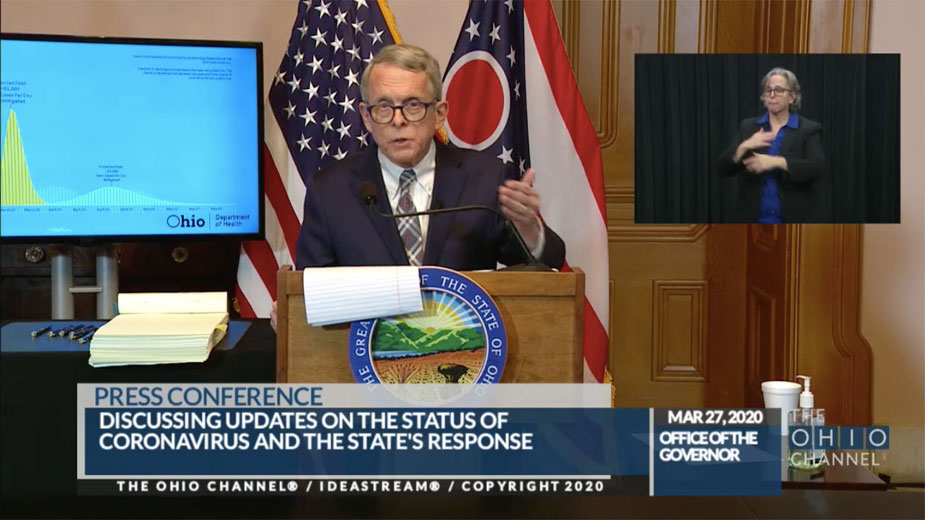DeWine: Surge of COVID-19 Cases Coming in Next 2 Weeks
YOUNGSTOWN, Ohio – After a phone call with officials from the Cleveland Clinic Friday morning, Gov. Mike DeWine and Ohio Department of Health director Dr. Amy Acton said the state is about two weeks from seeing a surge of coronavirus diagnoses that will put a strain on the state’s health-care systems.
“I don’t want to alarm people, but we need to understand what we’re up against,” DeWine said Friday at his daily press conference. “Everything on the ground indicates this is coming. It’s already here. Every piece of evidence we have says this doubles in six days. And another six days. And another.
“We have a long way to go and that’s the stark reality of it,” he continued. “The good news is hospitals have planned for this.”
In that model from the Cleveland Clinic, he added, the state’s peak caseload is three times above capacity, even with efforts to slow the spread such as social distancing and the stay-at-home order for nonessential businesses. The state’s newest model also shows a peak of up to 10,000 new diagnoses daily and a likely peak in mid-May.
“Watch what is happening in New York City,” Acton said. “They are running out of supplies. They’re wearing garbage bags for gowns. There is no health-care system in the world that was built for this. … This is that worst nightmare of a pandemic.”
In response, DeWine has broken hospitals in the state into eight regions and asked each area to submit reports to his office by tomorrow morning for how they will respond to the surge in COVID-19 cases, with final drafts approved by noon Monday.
“We will post the regions and we will make available the broad outline of what people in each region can expect to see,” DeWine said. “We’ll let people know what’s going to be happening and we’ll do this as we move forward.”
Among the steps already discussed are new equipment and technology – such as newly made parts that allow ventilators to be used for multiple patients at once – and the redistribution of staff, such as having doctors not on call act as nurses or having plastic surgeons whose elective surgeries have been suspended perform other surgeries. Also on the table, she continued, are early graduations for the state’s medical schools and allowing such students who aren’t in their final year more leeway in working in medical centers.
“We’re turning what we have into more,” Acton said.
To start the daily briefing, DeWine signed House Bill 197 into law Friday afternoon, approving several coronavirus relief measures to businesses and public entities across the state.
Among the measures in the bill passed by the Ohio statehouse earlier this week are waiving school testing requirements for the remained of the school year, extending medical licensing, allowing local governments to host virtual meetings so long as they are available to the public and pushing the state’s tax deadline to July 15 in order to coincide with the postponed federal deadline.
Joining DeWine via phone was Sen. Rob Portman, who provided an update on Congress’ unanimously passed relief package that was sent to President Donald Trump today. Included in the $2.2 trillion package are expanded SBA loans.
Those loans will be available through some 800 banks in Ohio next week. If the loans are used to pay for payroll, rent or mortgage payments, or utilities, the loans will be converted to grants, he said. Also for businesses is a retention tax credit, which offers businesses with fewer than 500 employees credits for retaining payroll through the coronavirus pandemic.
“These can work together if you use the SBA loan for rent or utilities,” the Republican senator said. “It’s a combination that can be very helpful.”
The package also includes $115 billion for the health-care sector: $100 billion in grants and $15 billion in payment increases for Medicare and Medicaid reimbursements.
“This will help,” he said. “It may help enough, it may not. But at this point, many hospitals are suffering economically because they’re not doing elective surgeries that make up a large part of their revenue, in some cases their only profitable business.”
According to the Ohio Hospital Association, the state’s suspension of elective surgeries means a collective $1.2 billion decrease in revenue for the state’s hospitals.
DeWine also announced a state effort to support small businesses through the creation of a directory of such businesses, available at Ohio.org/supportlocalohio. Among the categories users can browse are restaurants offering carryout service, retailers with online shopping and virtual attractions and activities, such as the Pro Football Hall of Fame.
A link on the website allows businesses to create their own listings.
“These are challenges times but if we can support local shops and restaurants, that’s great,” he said. “We should try to do that.”
For individuals, those who filed their 2018 or 2019 income taxes can expect to receive payments up to $1,200 in the coming weeks.
“This is something that’s essential right now just to get people cash quickly. This will be the fastest implementation,” Portman said. “You don’t have to sign up. It’s automatically sent out if you filed income taxes last year or this year … or if you receive Social Security benefits.”
In tomorrow’s daily briefing, DeWine, Acton and Lt. Gov. Jon Husted will discuss the state’s supply of medical equipment and Sen. Sherrod Brown will give an update of federal work on the coronavirus pandemic.
Copyright 2024 The Business Journal, Youngstown, Ohio.



